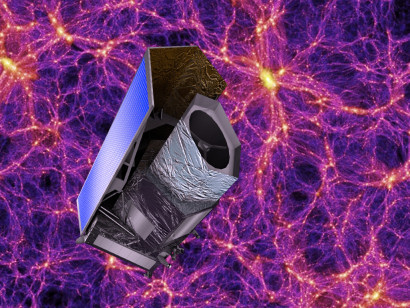Euclid Netherlands Science Data Centre awarded NWO-Groot funding

Euclid is the next cosmology mission of the European Space Agency, ESA. It will study the dark energy and dark matter. The NWO-Groot funding of 1.985.000 euro will be used to establish a Dutch Science Data Centre with which astronomers in the Netherlands can access the data from this satellite, and participate in the scientific analysis.
The Euclid Netherlands Science Data Centre is a collaboration between the Netherlands Research School for Astronomy (NOVA), Space Research Organization Netherlands (SRON), the Leiden Observatory, Target, RUG’s Center for Information Technology (CIT) and will be hosted by the University of Groningen. The Science Data Center will support the Euclid mission, which is due for launch in 2020. The Euclid satellite will map a large part of the sky from space by means of enormously detailed optical and near-infrared imaging and spectroscopy. These data will be used to obtain in exquisite detail the properties of billions of galaxies over a major part of the history of the expanding Universe. This will test Einstein’s theory of General Relativity and will help to solve one of the outstanding mysteries in current physics and cosmology: the nature of dark matter and dark energy.
At the RUG’s Center for Information Technology the Euclid Science Data Center (SDC) will initially use Target’s computational hardware park and will involve the staff of the Target Expertise Center. The SDC is already building, in partnership with ESA the Euclid Mission Archive, applying the Astro-WISE technology developed by OmegaCEN and Target. The Euclid Mission Archive is an innovative distributed information system which will serve 1000 researchers spread over Europe, also during the preparation phase of the mission, scheduled for launch in 2020.
The SDC will also host Petabytes of data from ground-based telescopes, including the Dutch-led KiDS imaging survey which uses the OmegaCAM camera at ESO’s VST telescope in Paranal, Chile. KiDS data and other ground-based surveys will be used to measure distances to galaxies, a key ingredient to map the evolution of dark matter and dark energy over time. The Leiden Observatory is involved in building a near- infrared data reduction pipeline, which will also be operated at the SDC.
Euclid is a Big Data project with more than ten Petabytes of observational data and catalogues, which eventually will contain detailed information on two billion galaxies. This is an important spin-off of the Target project, funded by the Samenwerkingsverband Noord Nederland (SNN), European Fund for Regional Development, Dutch Ministry of Economic Affairs, Agriculture and Innovation (Pieken in de Delta), and the provinces of Groningen and Drenthe. This project will also enable the expertise center at the CIT and OmegaCEN to continue their mission until 2019. “A great development and opportunity for the RUG and the North of the Netherlands”, says the Target lead prof. Edwin Valentijn.
Dark matter was hypothesized as early as the 1930s but nearly a century after astronomers still can't grasp its nature and understand its properties. Devising techniques to probe dark matter is extremely challenging because it doesn't interact with electromagnetic radiation and therefore remains invisible to our telescopes. Its presence can only be inferred indirectly by measuring its gravitational pull on light, an effect known as gravitational lensing.
MORE INFORMATION
Target is a consortium of ten public and private partners that have set up an expertise center for R&D of large-scale scalable information systems that can handle massive (Petabyte range) data volumes. Located at the Center for Information Technology in the University of Groningen, the Netherlands, the data infrastructure facilities of Target offer extensive computational and storage power. Currently, several large scientific projects with very diverse processing and archiving requirements are hosted on the Target infrastructure (LOFAR, LifeLines, Monk, KiDS/VIKING, Euclid). Additionally, the Target consortium is strongly connected to and actively collaborates with commercial partners in order to translate its collective expertise and newly obtained insights to socially-relevant, high impact and application-driven solutions in today’s increasingly data-rich world. Stretching the possibilities of information systems to intelligently capture useful information from the continuously growing and often formidable “data avalanche” , Target aims at developing the technology that can arm society with the tools to better understand and sustainably manage the world around us.
CONTACTS
Koen Kuijken, Leiden Observatory, Leiden University
Email:
kuijken strw.leidenuniv.nl
Tel: +3171 527 5848
Mobile: +31 628 956 539
Personal website: http://home.strw.leidenuniv.nl/~kuijken/
Gijs Verdoes Kleijn, Kapteyn Institute, University of Groningen
E-mail:
verdoes astro.rug.nl
Tel: +31 50 3638326
Mobile: +31 654 658 050
Personal website: www.astro.rug.nl/~verdoes
| Last modified: | 22 December 2023 11.34 a.m. |
More news
-
24 March 2025
UG 28th in World's Most International Universities 2025 rankings
The University of Groningen has been ranked 28th in the World's Most International Universities 2025 by Times Higher Education. With this, the UG leaves behind institutions such as MIT and Harvard. The 28th place marks an increase of five places: in...
-
05 March 2025
Women in Science
The UG celebrates International Women’s Day with a special photo series: Women in Science.
-
16 December 2024
Jouke de Vries: ‘The University will have to be flexible’
2024 was a festive year for the University of Groningen. In this podcast, Jouke de Vries, the chair of the Executive Board, looks back.
